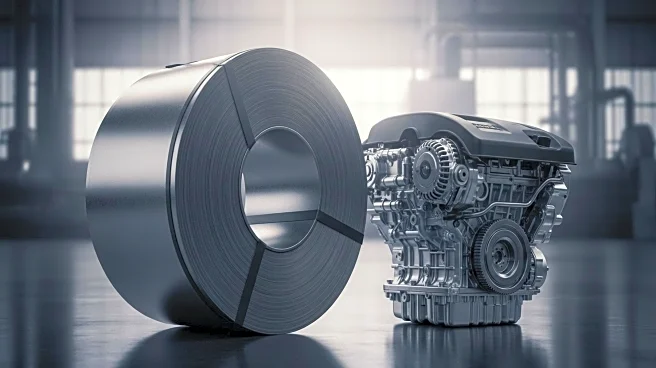What's Happening?
The European Union has announced a significant increase in steel tariffs and a reduction in import quotas, causing alarm in the United Kingdom. The EU plans to cut tariff-free quotas on imported steel by 47% compared to 2024 levels and increase tariffs from 25% to 50% on excess imports. This decision aims to protect the EU steel industry, safeguard jobs, and support decarbonization efforts. The move has been met with immediate concern from the UK, where the steel industry is already facing challenges such as closures and job losses. Gareth Stace, director general of UK Steel, described the situation as potentially the biggest crisis the UK steel industry has ever faced. The EU accounts for approximately 80% of UK steel exports, making the tariffs a significant threat to the industry.
Why It's Important?
The EU's tariff hike poses a substantial risk to the UK steel industry, which relies heavily on exports to the EU. The increased tariffs could severely limit access to the UK's largest market, exacerbating existing pressures from global competition and rising energy costs. The automotive industry, which sources a large portion of its steel from within the EU, is also concerned about the potential inflationary impact on market prices. The European Automobile Manufacturers' Association has warned that the restrictions could threaten the domestic car industry by reducing the ability to relieve market pressure through imports. The situation underscores the interconnectedness of European industries and the potential for trade policies to have wide-reaching effects.
What's Next?
The UK government is likely to seek an exemption from the EU tariffs, similar to the exemptions granted to countries in the European Economic Area and potentially Ukraine. Discussions are ongoing between the UK, EU, and US regarding steel tariffs, with the possibility of retaliatory measures not ruled out. British Industry Minister Chris McDonald emphasized the importance of protecting trade flows between the UK and EU while addressing global challenges. The outcome of these discussions could significantly impact the future of the UK steel industry and its trading relationships.
Beyond the Headlines
The EU's decision reflects broader global challenges in the steel industry, including overcapacity and competition from cheaper imports, particularly from China. The tariffs are part of a larger trend of countries implementing protective measures to support domestic industries. However, these measures can have unintended consequences, such as increased costs for industries reliant on steel, like automotive manufacturing. The situation highlights the delicate balance between protecting domestic industries and maintaining competitive market conditions.










